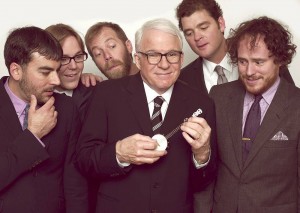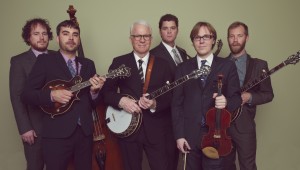Exclusive Q and A: Steep Canyon Rangers' Woody Platt Talks Steve Martin, DelFest, and Just Where Bluegrass is Headed
posted in: Country • Exclusive Interviews
 Steep Canyon Rangers have always been a much-loved bluegrass band, but this past year has taken it to new heights.
Steep Canyon Rangers have always been a much-loved bluegrass band, but this past year has taken it to new heights.
The band’s 2011 album with Steve Martin Rare Bird Alert went to No. 1 on Billboard’s Bluegrass Chart and won a GRAMMY Award nomination. The band’s 2010 album Deep in the Shade stayed in Billboard’s Top 10 Bluegrass chart for eighteen weeks. Headlining gigs at MerleFest, Bonaroo and other high profile events have followed.
Now the band is set to join with Martin again when it co-headlines DelFest, named for founder and bluegrass legend Del McCoury, the annual bluegrass extravaganza on Memorial Day Weekend in Cumberland, Maryland.
Although other events with Martin will follow, the band’s main focus this year is touring behind its just-released album Nobody Knows You.
Steep Canyon Rangers guitarist and lead vocalist Woody Platt took time out of his jam-packed schedule to talk to OurStage about the past year and just where Steep Canyon Rangers is headed in the near future.
OS: It had to be great working with Steve Martin and playing all the high profile events you’ve done in the past year or so. How did you work in a new record, too?
WP: We had great success with Steve and we wanted to follow that up with a solo record from us. The exposure we got through Steve was great but we also want to work on just our own music. When we’re traveling, we are usually out ten to twelve days in a row and sound check isn’t until about 4:30 so we had some time [to write, demo and otherwise develop the album]. We worked very hard on it last year. Charles [R. Humphrey III, the bassist) and Graham [Sharp, the banjo player] are very, very serious about songwriting and very good at it, so they worked on [the new songs] all the time.
 OS: So many bluegrass bands rely solely on playing standards but your band doesn’t.
OS: So many bluegrass bands rely solely on playing standards but your band doesn’t.
WP: It has always been our thing, refusing to play the bluegrass standards. We have always played our own songs even when that’s been a bit hard to do.
OS: You must think, as I know Del McCoury does, that various styles of bluegrass are vital for the genre to survive.
WP: I do. I think there is always room for more. We have with the mandolin player for Flatt and Scruggs {Curly Seckler] and we love traditional music and we respect it. They have earned our respect. But our thought has always been, no one is going to do those songs better than Bill Monroe! It’s not that we don’t like those songs. But who can do them better [than the legendary master bluegrass musicians].
OS: Where do you predict this will lead in bluegrass?
WP: I think that bluegrass is going to be very open and accept all of the branches. We’re really all coming from a similar root with banjos and fiddles and mandolins. I think in a lot of festivals and events [the various branches] are being embraced. Some want it to stay pure and really [scrutinize] the structure and format because they don’t want to lose traditional bluegrass as an art form. But it’s also very interesting to see how bluegrass is perceived in various parts of the United States. In the western part of the United States, we’re looked at as very traditional. In festivals in the southeast, we are looked at as a progressive band. It depends on how strict you want to be. I think for a lot of people, it depends on what their first impression of this kind of music was. We embrace it all and love it all.
OS: I’m always curious how bluegrass is received in Europe.
WP: We did a twenty-show German run, and played London and Manchester with Steve. There is absolutely affection for bluegrass in Europe. It’s pretty spectacular. Estonia, Prague and Italy have a lot of great bluegrass bands. In Sweden there are also a lot of really strong bluegrass influences. It’s very interesting to hear.

OS: So when it comes down to writing your own songs, what is the process?
WP: There are a few different approaches we have. For Charles, he often co-writes with people outside of the band. That’s cool for him because it gives him a different perspective. Once he’s [written a song] he’ll play it for me and then we will kind of work it up and bring it to the band. We don’t waste time! It’s the same with the other guys. We do what we have to do and then demo it. It’s pretty easy these days with all of these fancy computers. It’s so much easier these days to change and edit music.
OS: Define your latest album for me. Where does it stand in your catalog?
WP: Listening to our record, I think these are the best songs we’ve done. I also think they are fitting stylistically and instrumentally with who we are as people. We are trying to stay relevant and keep the music interesting for us. We are trying not to be cliché or follow themes. This is not a themed record. It is just who we are. Graham [who wrote seven of the twelve songs on the album] made a comment that we aren’t trying to appeal to one fan or another. We have been a band for ten years and we’ve grown and developed.
OS: How do you know when a song is right for your album?
WP: Something has to feel good right off the bat; enough of the songs strike me, as “this feels really good.” I want people to love, love, love this one particularly. I feel really excited about it.
OS: I know you’ve mentioned people have said some negative things including your band only found huge success because of collaborating with Steve Martin. They’ve also said that Steve Martin isn’t a real musician. Your response?
WP: Well, we do what we love and we love to play whether we are playing our own shows or with Steve. But we will always play because we love it and we love our sound.
This year, Steve will play more than fifty shows. He has done so much for bluegrass and we are honored to play with him. We can’t imagine not being involved with him and his music. He is a true musician and really good at it.
His work ethic is like none I have never seen. He would be happy to play a new song four hours straight, if that’s what it takes.
One thing people don’t realize how humble he is. He is not a boss. He is a musical partner and a band member. And he is our friend, first and foremost. That is what makes us feel like a group.
Find out more about Steep Canyon Rangers on the band’s Web site.
Details about DelFest are on the festival’s site.
Watch Steep Canyon Rangers and Steve Martin play during a visit to Letterman:
